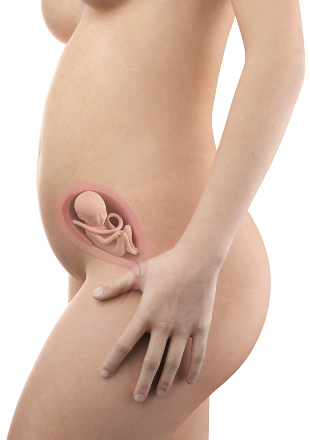Welcome to Week 18—nearly halfway through your pregnancy journey! As your body continues to change and grow, you may notice some new experiences and feelings, both exciting and a little surprising. This week is a wonderful time to pause, reflect, and connect with your baby, who is becoming more active and developed every day.
At this stage, your baby is about the size of a sweet potato, measuring roughly 5 to 6 inches long. Inside your belly, they’re twisting, kicking, and even making their first tiny movements, though you might only feel gentle flutters at this point. These first sensations, often called “quickening,” are one of pregnancy’s true joys—many moms say it makes everything feel more real.

You might also notice a few new changes in your own body. For instance, as your uterus grows, your belly is likely becoming rounder and more noticeable. Some moms develop a distinct line down the center of their belly, called the linea nigra. This is completely normal and tends to fade after birth.
You could also experience mild aches in your lower abdomen, called round ligament pain. These occur as your body gently stretches to accommodate your growing baby. Rest, gentle movement, and warm compresses can be helpful if you’re feeling uncomfortable—but remember, if any pain becomes severe or is accompanied by other symptoms, be sure to contact your healthcare provider promptly.
By now, many families start looking forward to the anatomy ultrasound, which often happens between 18 and 22 weeks. This special scan measures your baby’s growth and checks on their development, sometimes even revealing if you’re having a boy or a girl (if you wish to know).
Don’t forget to care for yourself, too. Staying hydrated, eating nourishing foods, and continuing light exercise can boost your energy and mood. Taking short walks, stretching, and sharing your feelings with trusted people can also help you enjoy this remarkable time.
Every pregnancy journey is unique, so trust your instincts—and know that support is always here. As you move through Week 18, be gentle with yourself, make space for wonder, and look forward to the milestones just ahead.
Your Baby’s Development This Week
At 18 weeks pregnant, your little one is working hard inside your belly, making big leaps in growth and development! This is a magical stage—your baby is now around 5 to 6 inches long, about the length of a cucumber, and continues to amaze with brand-new abilities and changes each day.
One of the most exciting things happening now is that your baby’s senses are really waking up. Tiny ears are fully formed and have moved into their final position on the sides of the head. Even though those ears look small, they’re starting to pick up sounds from the world around them. Your heartbeat, your voice, and even the whoosh of your blood are like a cozy lullaby. Some moms like to read or sing to their bellies—even if your baby doesn’t understand words yet, just hearing familiar voices can be soothing.
Your baby’s nervous system is also getting more sophisticated. Important protective coverings are forming around the nerves, which help messages travel faster and more efficiently. This means your baby’s movements are becoming more coordinated. You’ll soon experience “quickening”—those first gentle flutters or bubbles in your belly. It might feel like butterflies or tiny taps, making this week extra special for many first-time moms!
Meanwhile, your baby’s eyes are sensitive to light, even though they’re still closed. If you shine a bright flashlight on your belly, your baby might squirm and move away from the light—it’s a little peek into their growing sense of “sight”!
Inside, bone development is going strong. Those soft cartilage structures are hardening to become real bones. The first bones to fully form are in the legs and the inner ear, which help with balance and movement. Pretty soon, your little one will be stretching, yawning, sucking, and maybe even making their first tiny frown (how cute and amazing is that?).
- Digestive system: Your baby is swallowing a little amniotic fluid every day, practicing for feeding after birth. This fluid makes its way through the digestive tract and, together with shed cells, will become your baby’s very first “dirty diaper”—a sticky, dark substance called meconium.
- Lungs growing: The delicate branches of your baby’s lungs are forming more tiny tubes. Though your little one won’t take their first real breath until after birth, this early groundwork is crucial for healthy breathing.
- Body movements: You may feel gentle kicks, stretches, or even a hiccup or two. Each wiggle is an important sign that your baby’s muscles and coordination are developing nicely.
This week, your baby is very busy inside your womb. Every wiggle, swallow, and new connection in the brain is helping build strong foundations for life outside the womb. As you marvel at your growing belly, take a moment to appreciate how much is happening—your baby is learning to hear, move, and interact, all in the cozy warmth of your loving body. You’re doing an incredible job, and your baby is, too!
Changes in the Mother’s Body
Reaching 18 weeks of pregnancy is a wonderful milestone. By now, many moms start to truly “feel” pregnant, both emotionally and physically. Every woman’s experience is a little different, but most notice significant changes in their bodies around this time. Here’s what you can expect and how to manage the new sensations week 18 brings.
Your Growing Belly
Your baby is getting bigger, and so is your belly! It’s common for your uterus to have expanded enough that your bump becomes much more visible, sometimes even to strangers. This is the phase where maternity clothes start to feel more comfortable than your regular wardrobe.
Because your uterus is now rising higher in your abdomen, you might find that you need to shift how you sit or move. Getting up from a chair or out of bed might take a bit more effort than it used to, so remember to move slowly and listen to your body.
Feeling Your Baby Move
This is an exciting week for many expectant mothers because you may start to feel your baby’s first gentle movements, often described as flutters or “butterflies” in your lower belly. These little sensations, called “quickening,” can be easy to miss at first, but as your baby grows stronger, the movements will be more noticeable.
Skin and Hair Surprises
Hormones can cause a few surprising changes. You might notice a dark line, called the linea nigra, running down the center of your belly. Some women develop new freckles or see existing moles darken. Others find that their skin appears brighter and their hair seems fuller and shinier. But don’t worry if your experience is different—every mom’s journey is unique!
Sneezes, Sniffles, and Nosebleeds
It’s common to find your nose feels stuffy or that you experience some nosebleeds as your blood volume increases and your nasal passages become more sensitive. A humidifier and gentle saline sprays may help keep things comfortable.
Body Comfort and Sleep Shifts
Carrying extra weight around your middle can put some pressure on your lower back and hips. You may feel more aches than before, especially after a long day. Many moms find it helpful to use a firm pillow between their knees or behind their backs at night to stay comfortable. Lying on your left side also encourages healthy blood flow to your baby.
- Supportive shoes can help reduce sore feet and back pain.
- Gentle stretching and prenatal yoga may relieve muscle tightness.
- Staying active with walks or swimming keeps circulation healthy and boosts energy.
Digestive Shifts
As your baby grows, your organs shift slightly to make space. It’s normal to have occasional heartburn or indigestion. Eating smaller, more frequent meals and avoiding spicy or greasy foods often helps manage these symptoms.
Emotional Changes
Alongside physical changes, you might notice your feelings are stronger than usual. It’s normal to feel a mix of excitement, nervousness, and even moments of overwhelm. Connecting with loved ones, joining prenatal classes, or simply taking quiet moments for yourself are all great ways to care for your emotional well-being.
Remember, every pregnancy is different. If you’re ever uncertain or have a symptom that worries you, don’t hesitate to reach out to your healthcare provider. Your body is working hard to support your growing baby—be gentle with yourself and celebrate this remarkable stage!
Medical Checkups and Screenings You Might Need at 18 Weeks
As you reach week 18 of your pregnancy, it’s important to keep up with routine checkups and look ahead to some key screenings. These visits are designed to help you and your baby stay healthy and make sure everything is progressing just as it should.
- Regular Checkup: Most doctors will still want to see you about once a month during the second trimester. At your appointment, your healthcare provider will usually check your weight, blood pressure, and may ask about any new symptoms you’ve noticed—like changes in movement or new aches and pains.
- Measuring Your Belly: Around this stage, many doctors begin measuring the size of your uterus (fundal height) to make sure your baby is growing at a healthy rate. They’ll gently run a tape measure from your pubic bone to the top of your bump—it’s simple and shouldn’t hurt at all.
- Listening to Baby’s Heartbeat: Hearing your little one’s heartbeat is often a highlight of these visits. Your provider will help you listen using a small device called a Doppler. It’s quick, painless, and can be a really magical moment!
- Planning the Anatomy Scan: Now is the time to confirm your appointment for your big 20-week ultrasound—often called the “anatomy scan.” This scan is a detailed look at your baby’s organs, limbs, and overall growth. Your OB might talk through what the scan checks, how to prepare, and what you might see during the exam. If you have questions about the scan—or if you want to know whether it’s possible to find out your baby’s sex—this is a good time to ask.
- Blood and Urine Tests (If Needed): Depending on your health, your doctor might order blood or urine tests at this stage if there’s anything they want to keep an extra eye on (for things like iron levels, signs of infection, or how your body is handling sugar).
- Discussing Genetic Screenings: If genetic screenings were offered earlier and you had them done, this is a common time to discuss the results. If you didn’t have screening yet, talk about which options are still available and which are right for you.
- Talking About Symptoms and Concerns: Don’t be shy about sharing anything on your mind. Many women experience things like headaches, strange cravings, or emotional ups and downs right now. Your doctor is there to listen and offer support, so bring up anything you’re wondering or worried about—even if it feels small.
These checkups are not just about medical tests—they’re a chance for you to ask questions, get helpful advice, and feel supported, every step of the way. If you have a partner, bringing them along can help them feel connected too, so don’t hesitate to invite them if you like.
Remember—you know your body best. If something feels different or you’re simply uncertain about a symptom, reach out to your care provider between visits. Your peace of mind is important!
Nutritional Tips and Physical Exercise
Week 18 is a wonderful time to focus on both what you eat and how you move. As your baby continues to grow and develop new abilities, caring for your own body will help keep you feeling your best while giving your little one the nourishment they need.
Here are some practical tips for nutrition and safe movement during this stage:
- Eat Colorful Foods: Try to fill your plate with a variety of brightly colored fruits and vegetables each day. Foods like berries, spinach, carrots, sweet potatoes, and oranges are packed with vitamins and antioxidants that support both you and your baby’s development.
- Snack Smartly: Instead of reaching for chips or sweets, keep healthy snacks nearby such as yogurt with fruit, crackers with nut butter, or cut-up veggies with hummus. These will help keep your energy steady and provide important nutrients between meals.
- Focus on Calcium and Iron: Now that baby’s bones are hardening, calcium-rich foods like milk, cheese, leafy greens, and fortified juices are especially important. Pairing iron-rich foods (like lean meats, beans, and lentils) with vitamin C sources (such as strawberries or bell peppers) helps your body absorb more iron and reduces the risk of feeling tired or dizzy.
- Season Foods Wisely: If you’re dealing with nasal congestion or swelling, choosing lower-sodium seasonings like herbs and lemon juice over salt, and drinking plenty of water, can make you feel more comfortable.
- Stay Hydrated: With your body working hard to support your baby, aim for at least 8-10 cups of water daily. If plain water starts to feel boring, try adding a splash of fruit juice, a slice of lemon, or some fresh cucumber slices for flavor.
- Be Mindful with Exercise: If your doctor has cleared you for physical activity, pregnancy-safe exercises like walking, swimming, or prenatal yoga can help reduce aches and keep your body strong. Listen to your body—if you feel dizzy or uncomfortable, take a break. Focus on low-impact movement and gentle stretching to ease tension and support circulation.
- Try Simple Core Exercises: Your belly will continue to grow, shifting your center of gravity. Gentle core exercises (like seated pelvic tilts or side-lying leg lifts) can help support your back and may make daily movements easier.
- Prioritize Rest and Recovery: It’s natural to feel a bit more tired some days. Balance gentle exercise with plenty of rest—listen to your body and take short naps or pause for relaxation whenever you need to recharge.
Remember, every pregnancy is unique, so these are just guidelines. If you have food allergies, special dietary needs, or aren’t sure what activities are right for you, be sure to check in with your healthcare provider. Nourish yourself with kindness, and don’t be afraid to ask for support along the way—you’re doing amazing!
Weekly Checklist
Week 18 is a time of exciting changes for both you and your baby! Here’s your helpful checklist for this week—designed to make sure you’re taking care of your body, preparing for the next steps, and enjoying these magical moments.
- Schedule Your Anatomy Scan: If you haven’t already, book your 20-week ultrasound appointment. This detailed scan checks how your baby is growing and developing. It’s a special milestone you won’t want to miss!
- Start a Movement Journal: Keep track of any baby movements you begin to notice. At first it may feel like gentle flutters or bubbles, but each little kick or twist is a sign of your growing connection. Jotting down when you feel them can help you remember these precious first wiggles and spot patterns later on.
- Take a Few Moments to Rest and Stretch: As your bump grows and your body adjusts, gentle stretching or side-lying rest can help with backaches and leg cramps. Try stretching before bed or when you wake up for added comfort.
- Check in on Your Iron Intake: Your blood volume is increasing, so your need for iron goes up too. Add more iron-rich foods to your meals, like spinach, beans, lentils, and lean meats—and enjoy a glass of orange juice with them to help with absorption.
- Look for a Pediatrician: Begin researching local pediatricians if you haven’t already. Make a shortlist and set up get-to-know-you visits, so you’ll feel confident and supported when your baby arrives.
- Practice Good Posture: As your center of gravity shifts, standing and sitting with your shoulders back and head up can ease discomfort and help with balance. Consider a supportive chair pillow for work or lounging at home.
- Stay Hydrated and Snack Smart: Carry a water bottle with you and sip often. Choose snacks like yogurt, trail mix, or sliced veggies to provide steady energy and nourish your growing baby.
- Take Care of Your Skin: Your skin may feel itchier or more sensitive as it stretches. Use a gentle moisturizer daily to help prevent dryness and make your skin feel more comfortable.
- Listen to Your Body if You Feel Dizzy: If you notice lightheadedness, move slowly from sitting to standing, eat small meals throughout the day, and let your doctor know if dizziness happens often.
- Connect with Your Partner or Support Circle: Share your feelings, ask for help when you need it, and celebrate each new milestone with those close to you. Your emotional health matters just as much as your physical health during this journey.
Remember, every pregnancy is unique. If you have any worries or unusual symptoms, don’t hesitate to reach out to your healthcare provider. Take care of yourself and treasure the special changes happening this week!
When to Call Your Doctor
It’s natural to have questions as your pregnancy moves forward. Most changes during week 18 are a normal part of your baby’s development, but there are a few situations where you should reach out to your healthcare provider. Trust your instincts—if something feels off, it’s always okay to call.
Here are some signs that deserve a prompt phone call or visit:
- Heavy Bleeding: If you notice any bright red bleeding, or if you’re soaking through a pad in an hour, call your doctor right away. Light spotting can be common, but heavier bleeding should be checked out.
- Severe Abdominal Pain or Cramping: Mild aches as your body grows are normal, but sharp, continuous pain that doesn’t let up is a reason to get in touch. Sudden, severe pain—especially if it comes with bleeding—should be addressed immediately.
- Severe Headaches or Vision Changes: Persistent headaches that don’t go away, or new vision problems like blurriness, flashing lights, or spots in your vision, could signal something serious and deserve prompt attention.
- Swelling in Your Face or Hands: Some swelling in the feet and ankles is common, but noticeable swelling in your face, hands, or around your eyes—especially if it comes on quickly—should be discussed with your provider.
- Sudden or Severe Shortness of Breath: Mild breathlessness is normal for many pregnant women, but if you feel like you truly can’t catch your breath or if you have chest pain as well, don’t wait to seek help.
- Fever Over 100.4°F (38°C): A mild temperature can occur, but a sustained or high fever could be a sign of infection and should not be ignored.
- Leaking Fluid: If you feel a sudden gush or steady trickle of fluid from your vagina, it could mean your water has broken early. Contact your healthcare provider right away.
- Itching All Over: If you develop intense itching—particularly on your hands and feet—without a rash, let your doctor know. This can sometimes indicate a liver condition that needs testing.
- Reduced Baby Movement (Later Weeks): By week 18, you might only be feeling occasional gentle flutters. But if you’ve been feeling movement and suddenly notice a dramatic decrease or no movement, call your doctor.
- Any Symptoms That Worry You: No one knows your body and your pregnancy better than you. If you’re feeling anxious about a symptom or just have a sense that something isn’t right, don’t hesitate to reach out. You are never bothering your healthcare team—they are there to support you.
Remember, it’s always better to check in and have peace of mind. Your care team is there to answer your questions and help you feel safe and confident every step of the way.
Preparations for Baby
As you move through week 18, it’s natural to feel both excited and a little nervous about what’s to come. Your baby is growing, and this is a wonderful time to start preparing, both emotionally and around the house, for their arrival.
Here are some tips to help guide you through this special stage:
- Connect with your baby: Spend a few quiet moments each day talking, singing, or playing music. Even though your baby is still in the womb, those little ears are starting to hear you. It’s a comforting way to begin bonding and helps make your pregnancy feel even more real.
- Start a journal or keepsake box: Capture your feelings, changes you notice, or even jot down hopes and dreams for your little one. You might be surprised at how much it helps you process your thoughts and celebrate small milestones along the way.
- Tackle one small project at a time: Begin thinking about baby’s sleeping area. Whether it’s clearing a corner or starting to browse for a crib, breaking preparations into tiny steps can make it less overwhelming and more enjoyable.
- Organize important documents: Gather health insurance information, make a list of questions for your next doctor’s visit, and think about what paperwork you’ll need after your baby arrives. Getting these details sorted now means less to worry about later.
- Create a “rest spot” at home: Set up a comfy chair or corner with pillows and a blanket where you can unwind. This can become your go-to place to relax, read, or simply take a few deep breaths—important for both your well-being and your growing baby’s.
- Plan a special date: Enjoy time with your partner or loved ones. Go for a walk, have a cozy meal, or watch a favorite movie together. Strengthening your relationships now sets the stage for a supportive, loving team when the baby arrives.
- Practice asking for help: It can feel hard to reach out, but pregnancy is the perfect time to build your support network. Let family and friends know specific ways they can assist—like picking up groceries or prepping a meal. You deserve all the love and help offered.
Remember, you don’t need to have everything figured out at once. Little by little, you’re getting ready to greet your baby—and just by caring, you’re already doing a wonderful job. Celebrate each preparatory step, and know that it’s perfectly okay to enjoy the process.
Citations and References
- American College of Obstetricians and Gynecologists (ACOG) – Offers a detailed overview of fetal development around 18 weeks and maternal changes, including what to expect during the second trimester. Visit Source
- Mayo Clinic – Describes baby’s growth milestones, development of fetal senses, and common maternal symptoms like round ligament pain and nasal congestion during week 18. Visit Source
- Centers for Disease Control and Prevention (CDC) – Provides guidance on nutrition during pregnancy, including recommended folic acid intake and general dietary advice for pregnant individuals. Visit Source
- Cleveland Clinic – Explains fetal sensory development, preparation for anatomy scans, and common symptoms experienced during week 18. Visit Source
- National Institutes of Health (NIH) – MedlinePlus – Summarizes changes in the mother’s body, baby’s organ development, and the importance of prenatal vitamins at this stage. Visit Source
- March of Dimes – Offers evidence-based information about second-trimester prenatal care, scheduling of the anatomy ultrasound, and the significance of monitoring fetal growth and development. Visit Source
- World Health Organization (WHO) – Details best practices for maternal nutrition and prenatal health during all trimesters, supporting hydration and nutrient recommendations. Visit Source










